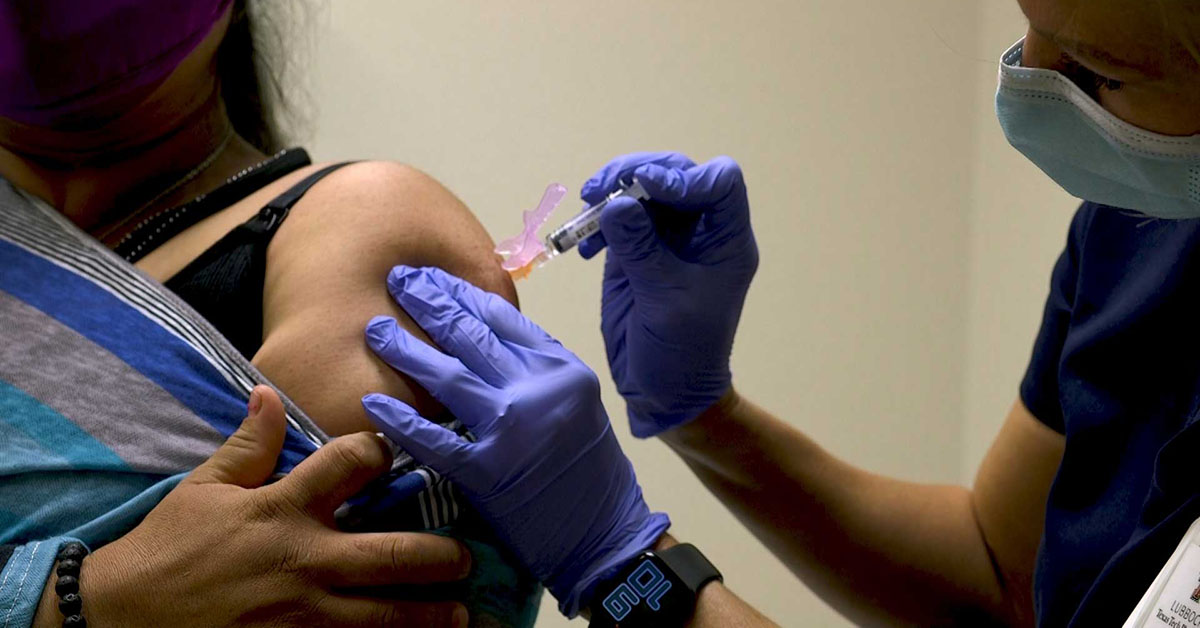Should Pregnant Women Get the Flu Vaccine?
TTUHSC expert says the vaccine is safe and protects the baby

Winter months are fast-approaching, and as the numbers of positive COVID cases climb, so does a sense of urgency around getting a flu vaccination. The concept of a “twindemic” in West Texas and across the country makes medical experts uneasy as the world anticipates the coming season.
For those who are expecting, it is natural to question the safety of medications, activities or even foods and drinks. Future parents and medical experts alike seek out what’s best for the baby during pregnancy. Because of this inevitable sense of caution, questions surrounding the safety of the flu vaccine come up every year, regardless of the current pandemic.
Fortunately, there is a reassuring answer to this question for pregnant women. According to Edward Yeomans, M.D., chairman of the Department of Obstetrics and Gynecology at Texas Tech University Health Sciences Center (TTUHSC) and maternal-fetal medicine specialist at Texas Tech Physicians, not only is it safe for pregnant individuals to get a flu vaccination, it actually helps protect the baby.
“For the first six months of life, the influenza vaccine is not effective,” said Yeomans, “so the only way to protect the infant is for the mother to be vaccinated.”
Additionally, Yeomans clarified that there are no birth defects or other adverse maternal or fetal consequences recognized with the vaccine, and that there are no serious side effects--no matter what trimester of pregnancy. This means that the flu vaccine is just as effective and safe for pregnant women as it is for others.
Part of the reason pregnant women are often concerned about risks surrounding the flu shot is due to a rumor that it can result in a higher risk of miscarriage. However, a recent large study conducted by the Centers for Disease Control (CDC) revealed that there is no evidence to support the rumor. Covering three flu seasons (2012-13, 2013-14, 2014-15), the study found no increased risk for miscarriage, including in early stages of pregnancy.

Pregnancy lowers the activity of the immune system, which is what places pregnant women in the high-risk category when it comes to both the flu and COVID-19. Since pregnant women are considered a vulnerable group, Yeomans explained that getting a flu shot is particularly important for soon-to-be mothers.
“Pregnant women are a particularly vulnerable group,” said Yeomans. “They're subject to a higher incidence of pneumonia, hospitalization, intensive care, unit admission and even adverse consequences for mom and baby.”
Especially during this pandemic, feeling flu-like symptoms can be frightening. While receiving a flu shot is the most efficient way for pregnant women to protect themselves against the flu, common hygienic behaviors such as regularly washing your hands, eating well and getting enough sleep can also help pregnant women make it through the illnesses of these winter months. If you think you might be sick, talk to your doctor right away about the best treatment for the flu to prevent any serious complications.
For more information about this year’s flu vaccine, visit TTUHSC’s flu page.
Related Stories
Celebrating Veterans: TTUHSC’s General Martin Clay’s Legacy of Service and Leadership
From his initial enlistment in the Army National Guard 36 years ago to his leadership in military and civilian health care management roles, Major General Martin Clay’s career has been shaped by adaptability, mission focus and service to others.
Texas Tech University Health Sciences Center School of Nursing Named Best Accelerated Bachelor of Science in Nursing Program in Texas
The TTUHSC School of Nursing Accelerated Bachelor of Science in Nursing (BSN) program has been ranked the No. 1 accelerated nursing program in Texas by RegisteredNursing.org.
TTUHSC Names New Regional Dean for the School of Nursing
Louise Rice, DNP, RN, has been named regional dean of the TTUHSC School of Nursing on the Amarillo campus.
Recent Stories
The John Wayne Cancer Foundation Surgical Oncology Fellowship Program at Texas Tech University Health Sciences Center Announced
TTUHSC is collaborating with the John Wayne Cancer Foundation and has established the Big Cure Endowment, which supports the university’s efforts to reduce cancer incidence and increase survivability of people in rural and underserved areas.
TTUHSC Receives $1 Million Gift from Amarillo National Bank to Expand and Enhance Pediatric Care in the Panhandle
TTUHSC School of Medicine leaders accepted a $1 million philanthropic gift from Amarillo National Bank on Tuesday (Feb. 10), marking a transformational investment in pediatric care for the Texas Panhandle.
Texas Tech University Health Sciences Center Permian Basin Announces Pediatric Residency Program Gift
TTUHSC Permian Basin, along with the Permian Strategic Partnership and the Scharbauer Foundation, Feb. 5 announced a gift that will fund a new pediatric residency.
